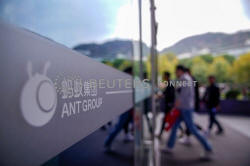Explainer: How mom-and-pop investors stumped up a record $3 trillion for
Ant shares
 Send a link to a friend
Send a link to a friend
 [November 02, 2020] By
Samuel Shen, Scott Murdoch and Julie Zhu [November 02, 2020] By
Samuel Shen, Scott Murdoch and Julie Zhu
HONG KONG (Reuters) - Retail investors bid
for a record $3 trillion worth of shares in Ant Group Co Ltd's dual
listing, in an unprecedented show of interest from mom-and-pop savers
betting on demand for its financial technology services in China.
The world's largest initial public offering (IPO) was split fairly
evenly between Shanghai's STAR Market and Hong Kong, raising about $37
billion including the greenshoe option of the Shanghai leg. From retail
investors alone, it attracted a bid value the equivalent of Britain's
gross domestic product.
Here's how China and Hong Kong retail investors managed to reach that
mammoth figure:
HOW MUCH RETAIL DEMAND DID ANT'S IPO GENERATE ON THE MAINLAND?
Chinese retail bids for Ant shares amounted to $2.8 trillion. That
compared with the $19.8 billion the 16-year-old fintech giant raised in
the entire Shanghai portion of its IPO, including the greenshoe - or
overallotment - option.

Ant in a statement late on Thursday said it will allocate retail
investors about 350 million shares,accounting for 18.3% of the Shanghai
offering. That means a retail allocation worth 24.1 billion yuan ($3.6
billion) based on the IPO price of 68.8 yuan per share.
Successful bidders must pay for their shares by 4 pm Shanghai time on
Monday or else the shares will be allocated to the sale's lead
underwriter.
HOW DID MAINLAND RETAIL INVESTORS MANAGE TO PULL TOGETHER $2.8 TRILLION?
The retail demand total did not involve payment upfront. Moreover, local
rules do not allow banks or brokerages to offer margin financing for
IPOs.
Each mainland retail investor was allowed to bid for one unit, or 500
Ant shares, for every 5,000 yuan worth of other Chinese shares already
owned, up to 317,000 Ant shares. No cash was needed to bid, and
investors allotted shares following a lottery-like draw must have enough
money to cover their bid.
The Shanghai portion of Ant's IPO was heavily skewed toward strategic
and institutional investors. Retail investors' chance of buying Ant
shares was further reduced by the participation of small hedge funds
that were not qualified to participate in institutional bidding.
[to top of second column] |

A logo of Ant Group is
pictured at the headquarters of Ant Group, an affiliate of Alibaba,
in Hangzhou, Zhejiang province, China October 29, 2020. REUTERS/Aly
Song

HOW DID RETAIL INVESTORS MANAGE TO STUMP UP $168 BILLION IN BIDS FOR THE HONG
KONG LEG OF ANT'S IPO?
Unlike China, margin financing is a booming business in Hong Kong. Margin
lending backed roughly half of the IPO's Hong Kong retail demand, local media
reported, helped by significant liquidity and interest rates as low as 0.4% for
short-term credit - roughly 10 days in such cases.
HSBC Holdings PLC said it set aside HK$150 billion ($19 billion) of loans to
support retail investor interest in Ant's IPO, while BOC Hong Kong Holdings Ltd
said it received over HK$100 billion in margin financing applications.
Some financial firms offered 20 to 30 times leverage to retail clients, banking
industry insiders told Reuters.
HOW DO RETAIL INVESTORS USE MARGIN FINANCING AND HOW DOES IT WORK FOR LENDERS?
Retail investors in Hong Kong borrow heavily as larger bids boost the chance of
share allocation, pinning their hopes of benefiting from a debut trading day
pop. They pay back the loan soon after listing and pocket the gains.
Margin lending is lucrative for financial firms in Hong Kong as they earn
interest on the loans irrespective of whether clients are allocated shares. They
also benefit from opening new brokerage trading accounts.
Margin financing money gets locked up at a designated clearance bank. Given
strong demand for Ant shares, the actual success rate for Hong Kong retail
investors is relatively low, meaning brokers and banks will only have to lend a
small portion of the margin financing applied for.

($1 = 7.7541 Hong Kong dollars)
(Reporting by Samuel Shen in Shanghai, and Scott Murdoch and Julie Zhu in Hong
Kong; Additional reporting by Donny Kwok in Hong Kong; Writing by Sumeet
Chatterjee; Editing by Christopher Cushing)
[© 2020 Thomson Reuters. All rights
reserved.] Copyright 2020 Reuters. All rights reserved. This material may not be published,
broadcast, rewritten or redistributed.
Thompson Reuters is solely responsible for this content. |